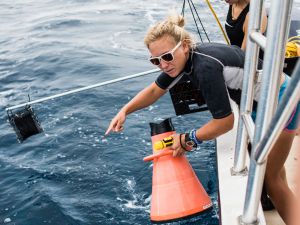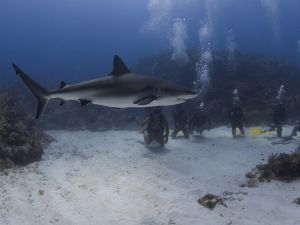Divers log in to benefit sharks
(CNS Local Life): For the past two years a volunteer group of sharkloggers has been assisting the Department of Environment (DoE) in gathering important data on sharks, in turn helping to understand, manage and ultimately protect their population in Cayman. Sharkloggers record sightings during a dive, noting location, time and species, which will be used to develop an action plan under the Shark Conservation Cayman initiative.
Volunteers for this year-round project comprise local divers, snorkellers and divemasters on Grand Cayman, Cayman Brac and Little Cayman. Their findings are submitted to the DoE. which uses the data to better understand shark behaviour in Cayman, stated a press release.
“In 2017 the sharkloggers logged 9,615 dives and 1,880 shark sightings,” said programme manager Johanna Kohler, who is a marine scientist with the DoE. “The information gathered complements the database from our surveys and acoustic tags.”
Noting the work of the volunteers, she added, “Thanks to the sharklogger’s efforts over the past two years, we were able to confirm and discover patterns, in terms of abundance and behaviour, of sharks in Cayman. Ultimately, this helps our scientists to better understand and monitor our sharks.”
Kohler said she hopes the programme raises awareness and educates people about the importance of sharks to Cayman’s reef ecosystems, which are a main tourist attraction.

Johanna Kohler directs handling of a BRUV (baited remote underwater video) system, used to study sharks (Photo by Nathan McCoy)
Dive industry professionals confirm the need for this work, both for the sharks in Cayman and tourists. “Sharks top most divers wish lists when asked what they would like to see on a dive, and seeing one is always the highlight of their trip,” said Steve Broadbelt, co-owner of Ocean Frontiers in East End, adding. “We ask all our divers to submit their photos to help log and track shark activity for this study.”
James Dudley of Tortuga Divers, also in East End, said of the sharkloggers: “As ambassadors of the underwater aquatic environment we are in a unique position to be able to monitor the shark numbers and dive sites they are seen at on a day-to-day basis. We are able to notice short-term or long-term changes.” Resident sharks are sighted daily in East End and have even earned names from local divers, stated the release.
“Burt and Ernie are usually found at one particular dive site. Smudge, Scarlet and Big Bertha at another area,” said John Buckley, a frequent diver at East End. “The sharks are inquisitive and will literally swim right up to you, swim amongst groups of divers, swim thru tunnels, canyons, and they come back around for more.”
Since 2008, DoE has partnered with Marine Conservation International to study Cayman’s sharks, with assistance from various funding sources and the support of local dive operators. In 2015 the Cayman Islands government granted full protection to all sharks in Cayman waters and created Marine Protected Areas on all three islands.
Because sharks are at the top of the food chain, they play a critical role in maintaining the balance of a reef ecosystem by keeping other fish populations in check, stated the press release. Research shows that shark populations around the world have declined and this negatively impacts their local reef habitat. Shark Conservation Cayman studies so far indicate Cayman’s shark population is present, although lower than expected.
The statistics show that Caribbean reef sharks and nurse sharks are the most common species spotted in Cayman waters. Other sharks include tiger sharks, black tips and hammerheads, but they are rare. Kohler said through the project they have learned that most shark species spotted around Cayman are classified as “near threatened” (IUCN Red List), and some sharks travel not only between areas of one island, but also between the three Cayman Islands.
The DoE plans to expand its sharklogger network to continue scientific monitoring surveys, as well as additional research, on such activities as mating, pupping behaviour and long-distance travel.
For more information, email the sharklogging programme
Category: Environment, Marine Environment


